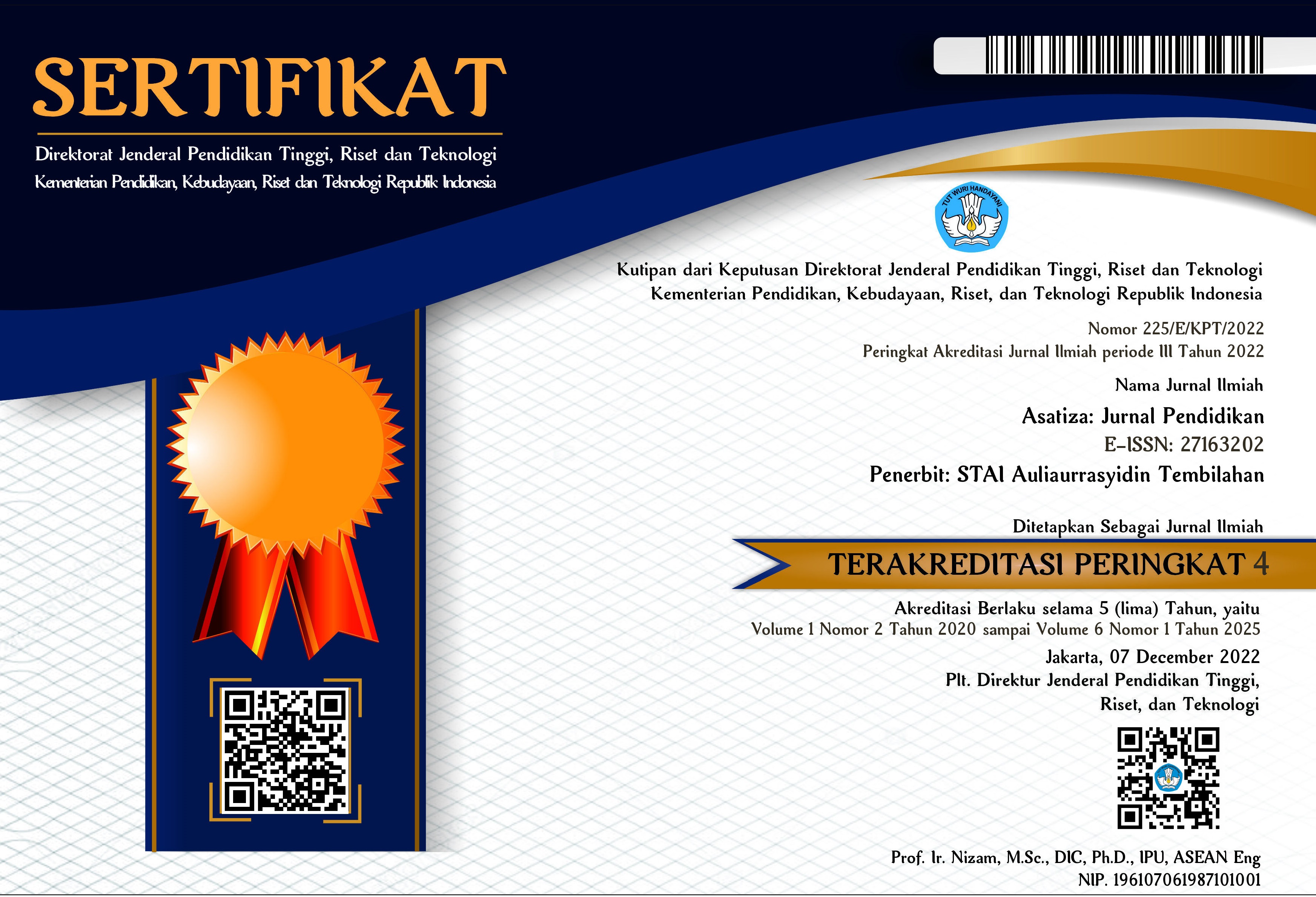Rural EFL Teacher’s Challenges in Improving Students’ Higher Order Thinking Skills
DOI:
https://doi.org/10.46963/asatiza.v3i2.520Keywords:
Rural, Challenges, Higher Order Thinking SkillsAbstract
This research aims to explore the rural EFL teacher’s challenges in improving students’ higher order thinking skills. The participant of this research was one English teacher who teach in the Junior High School in Gaung district. By using qualitative approach, the researchers collected the data employs non-participant observation in the teaching and learning process, interviewed the English teacher, and took documents by collecting the lesson plan. The result of this research showed that the challenges in teaching higher-order thinking skills in the rural area are the teacher’s knowledge and ability to teaching for HOTS is still low, passive students, students’ low English proficiency, the limitation of the school facility, and lack of sources. Based on the finding above, this research recommends to the school to give a facility or train the teachers about how to teach the students’ higher-order thinking skills based on the demand of 2013 Curriculum. Besides that, the development of HOTS in the rural area is not easy for the teachers because of all those challenges. So, the headmaster or the education authorities should find the solution to make all the students in the rural area can reach the expectation of the Higher Order Thinking based on 2013 curriculum.
Downloads
References
Anderson, L. W. (2005). Objectives, evaluation, and the improvement of education. Studies in educational evaluation, 31(2-3), 102-113. https://doi.org/10.1016/j.stueduc.2005.05.004
Anderson, L.W., & Krathwohl, D. R. (2001). A Taxonomy of Learning, Teaching, and Assessing: A Revision of Bloom’s Taxonomy of Educational Objectives. Ney York: Longman
Arafah, K., Amin, B. D., Sari, S. S., & Hakim, A. (2021, May). The development of higher order-thinking skills (HOTS) instrument assessment in physics study. In Journal of Physics: Conference Series (Vol. 1899, No. 1, p. 012140). IOP Publishing. https://iopscience.iop.org/article/10.1088/1742-6596/1899/1/012140
Febriana, M., Nurkamto, J., Rochsantiningsih, D., & Muhtia, A. (2018). Teaching in rural Indonesian schools: Teachers’ challenges. International Journal of Multicultural and Multireligious Understanding, 5(5), 11-20. http://dx.doi.org/10.18415/ijmmu.v5i5.305
Fenanlampir, A., Batlolona, J. R., & Imelda, I. (2019). The struggle of Indonesian students in the context of TIMSS and PISA has not ended. International Journal of Civil Engineering and Technology, 10(2), 393-406. http://www.iaeme.com/ijciet/issues.asp?JType=IJCIET&VType=10&IType=02
Hart, L. G., Larson, E. H., & Lishner, D. M. (2005). Rural definitions for health policy and research. American Journal of Public Health, 95(7), 1149-1155. https://doi.org/10.2105/AJPH.2004.042432
Helmawati. (2019). Pembelajaran dan Penilaian Berbasis HOTS, Higher Order Thinking Skills. Bandung: PT Remaja Rosdakarya.
Khoiriah, K., Jalmo, T., & Abdurrahman, A. (2018). Development of assessment instruments higher order thinking skills on science subjects for student grade eight junior high school. The Online Journal of New Horizons in Education, 8(2), 19-29. https://www.tojned.net/journals/tojned/articles/v08i02/
Ministry of Education Regulation No. 23 of 2006
Piaget, J. (1964). Cognitive development in children: Piaget, development and learning. Journal of Research in Science Teaching, 2.
Pramesty, N.S., Maghfiroh, A., & Mustikawati, D. A. (2022). Teachers’ challenges in teaching English to young learners in rural area at SDN 02 Sendang. Published online. Retrieved at http://eprints.umpo.ac.id/8844/4/NADHILLA%20SEKAR%20PRAMESTY%20277-12-35.pdf
Retnawati, H., Djidu, H., Kartianom, A., & Anazifa, R. D. (2018). Teachers’ knowledge about higher-order thinking skills and its learning strategy. Problems of Education in the 21st Century, 76(2), 215. https://www.ceeol.com/search/article-detail?id=942236
Shikalepo, E. E. (2020). Challenges facing teaching at rural schools: A review of related literature. International Journal of Research and Innovation in Social Science, 4(5), 211-218.
Downloads
Published
Issue
Section
License
Authors who publish with this journal agree to the following terms:
1. Copyright on any article is retained by the author(s).
2. The author grants the journal, right of first publication with the work simultaneously licensed under a Creative Commons Attribution shareAlike 4.0 International License that allows others to share the work with an acknowledgment of the work’s authorship and initial publication in this journal.
3. Authors are able to enter into separate, additional contractual arrangements for the non-exclusive distribution of the journal’s published version of the work (e.g., post it to an institutional repository or publish it in a book), with an acknowledgment of its initial publication in this journal.
4. Authors are permitted and encouraged to post their work online (e.g., in institutional repositories or on their website) prior to and during the submission process, as it can lead to productive exchanges, as well as earlier and greater citation of published work.
5. The article and any associated published material is distributed under the Creative Commons Attribution-ShareAlike 4.0 International License











2.png)



